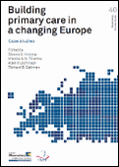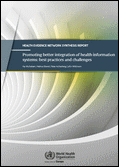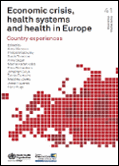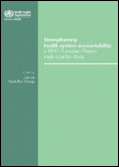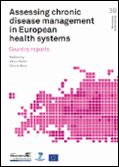 SELECTED FOR YOU... JULY-AUGUST 2015
SELECTED FOR YOU... JULY-AUGUST 2015
 books of the month
books of the month
 watch on health economics
watch on health economics
All the Selected for you
BOOKS
Building primary care in a changing Europe. Case studies.
Kringos D.S., Boerma W.G.W, Hutchinson A. et al., Bourgueil Y., Cartier T.
Copenhague : Office des Publications du Bureau Régional de l'Europe, 2015/05
Ce nouveau volume est constitué d'études de cas structurées résumant la situation des soins de santé primaires dans 31 pays européens. Il sert de complément à l'étude réalisée précédemment et intitulée « Building primary care in a changing Europe » (Assurer les soins primaires dans une Europe en mutation), qui donne un aperçu de la situation des soins primaires sur le continent, notamment les aspects liés à la gouvernance, au financement et aux ressources humaines ainsi qu'une présentation détaillée des profils de service. Ces études de cas déterminent le contexte des soins de santé primaires dans chaque pays ; les conditions économiques et de gouvernance essentielles ; le développement du personnel des soins de santé primaires ; le mode de prestation des services de soins primaires ; et une évaluation de la qualité et de l'efficacité du système de soins primaires. Les études illustrent les importantes variations nationales en termes d'accessibilité, de continuité et de coordination des soins primaires dans l'Europe d'aujourd'hui, ce qui complique l'évaluation du rôle de ces soins dans la performance globale du système de santé même s'il est de plus en plus prouvé qu'un secteur des soins primaires solide apporte de la valeur ajoutée.
Promoting better integration of health information systems: best practices and challenges.
Pikhart H., Pikhartova J.
Ce rapport aborde les tendances actuellement observées dans les États membres de l'Union européenne (UE) et de l'Association européenne de libre-échange (AELE) quant à la manière de promouvoir une meilleure intégration des systèmes d'information sanitaire. Afin d'en sonder les aspects pragmatiques, des experts de 13 États membres de l'UE ont été soumis à un entretien, dont les résultats ont été combinés aux conclusions d'une recherche documentaire. Le rapport de synthèse identifie les options stratégiques et les besoins suivants pour un examen plus approfondi, à savoir : continuer le travail sur certaines notions de base (tels que la disponibilité et la qualité des données, les inventaires de données et les registres, la normalisation, la législation, les infrastructures physiques et les capacités de la main-d'oeuvre) et sur des ensembles d'indicateurs davantage axés sur des concepts ; définir la notion de meilleure intégration et en démontrer les avantages concrets ; développer le leadership en matière de renforcement des capacités en vue de poursuivre l'intégration des systèmes d'information sanitaire ;poursuivre les échanges internationaux concernant les activités en cours dans ce domaine.(résumé de l'éditeur).
Cardiovascular Disease and Diabetes: Policies for Better Health and Quality of Care.
Paris : OCDE, 2015
This report examines how countries perform in their ability to prevent, manage and treat cardiovascular disease (CVD) and diabetes. The last 50 years have witnessed remarkable improvements in CVD outcomes. Since 1960, overall CVD mortality rates have fallen by over 60%, but these improvements are not evenly spread across OECD countries, and the rising prevalence of diabetes and obesity are threatening to offset gains.This report examines how OECD countries deliver the programmes and services related to CVD and diabetes. It considers how countries have used available health care resources to reduce the overall burden of CVD and diabetes, and it focuses on the variation in OECD health systems' ability to convert health care inputs (such as expenditure) into health gains.
Economic crise, health systems and health in Europe : country experience.
Organisation Mondiale de la Santé. (O.M.S.). Genève. CHE, European Observatory on Health Systems and Policies. Brussels. BEL,Observatoire Européen des Systèmes et Politiques de Santé. Bruxelles. BEL
Copenhague : : Office des Publications du Bureau Régional de l'Europe, 2015
The financial and economic crisis has had a visible but varied impact on many health systems in Europe, eliciting a wide range of responses from governments faced with increased financial and other pressures. This book maps health system responses by country, providing a detailed analysis of policy changes in nine countries and shorter overviews of policy responses in 47 countries. It draws on a large study involving over one hundred health system experts and academic researchers across Europe. Focusing on policy responses in three areas – public funding of the health system, health coverage and health service planning, purchasing and delivery – this book gives policymakers, researchers and others valuable, systematic information about national contexts of particular interest to them, ranging from countries operating under the fiscal and structural conditions of international bailout agreements to those that, while less severely affected by the crisis, still have had to operate in a climate of diminished public sector spending since 2008. Along with a companion volume that analyses the impact of the crisis across countries, this book is part of a wider initiative to monitor the effects of the crisis on health systems and health, to identify those policies most likely to sustain the performance of health systems facing fiscal pressure and to gain insight into the political economy of implementing reforms in a crisis (résumé des éditeurs).
Strengthening health system accountability: a WHO European Region multi-country study.
Organisation Mondiale de la Santé. (O.M.S.). Genève. CHE,European Observatory on Health Systems and Policies. Brussels. BEL,Observatoire Européen des Systèmes et des Politiques de Santé. Bruxelles. BEL
Copenhague : Office des Publications du Bureau Régional de l'Europe, 2015
This report takes stock of the measures that countries in the WHO European Region have put in place to strengthen their health systems' accountability since the adoption of the Tallinn Charter: Health Systems for Health and Wealth (2008) and the Health 2020 policy framework (2012). Recent years have undoubtedly brought significant challenges to the health systems in the Region, including international and national environments affected by an economic crisis, increased health needs and scarcity of resources. Nevertheless, countries across the Region have taken abundant and significant steps to improve health-system accountability. This report summarizes countries' experiences with strengthening health-system accountability in the context of the momentum created by the Tallinn Charter and Health 2020, by setting rigorous goals and measuring and reviewing health systems' performance.
Assessing chronic disease management in European health systems : country reports.
Organisation Mondiale de la Santé. (O.M.S.). Genève. CHE,European Observatory on Health Systems and Policies. Brussels. BEL,Observatoire Européen des Systèmes et Politiques de Santé. Bruxelles. BEL
Copenhague : : Office des Publications du Bureau Régional de l'Europe, 2015
Many countries are exploring innovative approaches to redesign delivery systems to provide appropriate support to people with long-standing health problems. Central to these efforts to enhance chronic care are approaches that seek to better bridge the boundaries between professions, providers and institutions, but, as this study clearly demonstrates, countries have adopted differing strategies to design and implement such approaches. This book systematically examines experiences of 12 countries in Europe, using an explicit comparative approach and a unified framework for assessment to better understand the diverse range of contexts in which new approaches to chronic care are being implemented, and to evaluate the outcomes of these initiatives. The study focuses in on the content of these new models, which are frequently applied from different disciplinary and professional perspectives and associated with different goals and does so through analyzing approaches to self-management support, service delivery design and decision-support strategies, financing, availability and access. Significantly, it also illustrates the challenges faced by individual patients as they pass through the system.(résumé des éditeurs).
